The World Wide Fund for Nature’s (WWF’s) urban environmental competition, “We Love Cities,” announced its world champ yesterday, city of Cape Town (congratulations, Mother City!) but how could the WWF – itself a regular companion of unethical capital (a.k.a. “bears feeding on toxic waste” or other less pleasant references) – not already have disqualified Durban? The rampant ballot-stuffing by Carver Media’s fake Twitter accounts, with pseudonyms like “Brittaney Jones” and “Alanna Sharon,” left a dumbstruck WWF only committed to painstakingly disqualifying particular votes from those accounts they determine to be bogus – as usual, unable to connect the dots of repetitive malevolent behaviour back to the power structure.

The jejune Carver Media operatives left their fingerprints all over the corpse of the name Durban, wrecking its latest silly brand strategy, greenwashing our city’s awful climate record, and in the process smearing the WWF contest – and yes, compelling the question, which other urban entrepreneurs in the 33 competing cities used similar scam operations? Praneetha Aniruth’s first line of defence was, after all, that she was the victim of a “third force smear campaign” by competitors to discredit Durban’s valiant efforts – a plausible fib soon unveiled by Mercury journalists and allied geeks who tracked the offending Tweeter and IP addresses back to Umhlanga.

Carver Media’s staff apparently signed a lucrative last-minute municipal consultancy through an irregular process, Durban’s notorious “Section 36” fast-track contracts-for-the-lads. This was the no-competition bidding technique that brought former city manager Mike Sutcliffe infamy during his 2002-11 reign, and yet which were abused even more after 2012 to benefit the likes of Carver Media. The firm made up twitter fake accounts – even stealing online photos of people across the world – so that Twitter and FB would ring with the sounds of applause for Durban’s environment record.
Social media expert Vee Govender – who works for the brics-from-below project at our Centre – gave this advice: “The city should cancel its contract with Carver Media immediately. Paying Carver R500K for ten days work is unacceptable and R3 million for the #ilovedurban brand goes beyond being ridiculous. The City should ask for a full refund for any payments made. These guys have had to have insiders to set up the deal.” The Democratic Alliance’s local caucus leader, Zwakele Mncwango, claims he knows which family-related insiders Carver relied upon, based within eThekwini’s economic development and governance cluster.
Just this sort of rancid tenderpreneurship has reached epidemic stage. The 2013 Manase Report into widespread Durban mismanagement and corruption was so ineffectual in halting the rot that one of the most brazen scams – an attempted R3 billion hijack of the Bisasar Road incineration tender by former (1996-2011) mayor Obed Mlaba (using his daughter as a front) – resulted in Mlaba’s redeployment from dirty Durban politics. He’s now SA’s High Commissioner in London, where, with Business Day’s brazen encouragement, Mlaba may well learn how to commit fraud on a slightly grander scale just down the road from Trafalgar Square, amongst filthy financiers in the City of London.
Going full-circle, Carver Media and municipal officials are using that very Bisasar Road dump’s six methane-to-energy turbines to claim – at WWF’s www.welovecities.org Durban portal – that because our municipality benefits from (a rather meagre) “7.5MWh of electricity produced from landfill waste, Durban is right to be proud of its renewable energy achievements.”
No, in reality, Bisasar Road is notorious in part because it is Africa’s largest formal landfill and was dumped upon an Indian and Coloured neighbourhood (Clare Estate) by white Apartheid officials in 1980. ANC promises in 1994 to close the racist dump were never kept. Instead, in 2002, Sutcliffe went to the World Bank to turn it into a climate financing pilot. It is a multifaceted disaster, not least in terms of climate policy.
The crucial problem concerns the way in which financing for the project was arranged. It required the Bank and United Nations to take seriously a claim originally made by Sutcliffe and Durban Solid Waste: the cost of the project was “additional” to what the city would have done anyway. That qualified it for subsidies as a “Clean Development Mechanism” (CDM).
The problem was, as city official John Parkin conceded in a recorded media interview during the COP17 climate summit here, that claim was a lie. As Parkin put it, “We already started the project and we were going ahead no matter what. So whether CDM became a reality or not, the project was going to go ahead.” This should have disqualified the project, had the Bank and UN officials been even slightly awake – but instead they were desperate for a South African renewable CDM pilot during the Joburg World Summit on Sustainable Development back in 2002.
The Carver Media group had no role in the original lie. But its embellishment through #ilovedurban fakery gave the WWF all the excuse it needed to boot these hucksters out of their competition. The obvious reason for a full disqualification was Carver Media’s pathetic cheating, but a better one is rejecting Carver Media’s Clean Development Mechanism scamming. Instead, we all need to challenge local economic development officials to try out some low-carbon strategies.
That would push them to rethink the current carbon-addicted sports-tourism focus and South Durban petrochemical-port complex expansion that has already made Durban’s per capita emissions higher than even Beijing’s or London’s. (More details can be found in Durban’s Climate Gamble: Playing the Carbon Markets, Betting the Earth.)
Only then would Durban offer the basis for love by an environmentally-aware society that can see through not only the Twitter twits but municipal climate gimmickry as well. DM


















 Become an Insider
Become an Insider